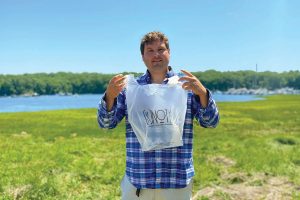
Ry Russell's company, Knot Plastics, creates plant-based bags from corn and hemp (courtesy photo).
(This is an abridged version of a story that appears in the September issue of Marijuana Business Magazine.)
Cannabis businesses have long struggled with the excessive packaging their products are required to use, employing extra layers of plastic and paper to ensure that flower or vape products are child-proof and don’t fall into the wrong hands.
But that struggle might be nearing its end: New plant-based paper and plastic packaging options are coming to market at a price point that’s comparable to conventional packaging.
That’s all thanks to the ingenuity of a few innovative minds that are working to use hemp and marijuana waste to make cannabis bio–circular.
“We are selling this medicine, these healing products, but we’re selling it in one of the most irresponsible ways possible. So the cannabis industry, in particular, has gotten to the point that it is begging for sustainable packaging solutions,” Halverson said.
Timing Is Everything
The economic shock caused by the coronavirus pandemic revealed the weaknesses in the global supply chain. It’s also created a serendipitous moment for North America’s green packaging companies, and executives say there are four reasons why now is the right time for cannabis brands to switch to green solutions:
- Reducing waste while increasing cannabis use and profits.
- Stopping waste pollution.
- Bio-circular requirements are the future.
- Consumers care.
Hemp to replace plastic
According to the U.S. Natural Resources Defense Fund, humans worldwide produce 300 million tons of plastic each year, half of which is used for single-use items—a figure nearly equivalent to the weight of the entire human population. Single-use plastics include packaging, bottles, wrappers, straws and bags, which are often disposed of immediately after use.
Knot Plastic, based in Saco, Maine, set out in February to create safe, nonplastic alternative packaging products.
When the COVID-19 pandemic hit, Knot Plastic co-founder Ry Russell and his partner, engineer Michael Osborne, had already done all the tooling and were ready to manufacture cannabis pre-roll containers. But when manufacturers were shut down, they quickly pivoted to develop the plant-based Knot Plastic bag, having quarantined themselves in a factory to contain any potential spread of coronavirus.
The team started with ethanol because of the abundant corn supply and because they thought there was a shortage of hemp, making the raw material cost-prohibitive. But when they learned about the oversupply of hemp biomass from the 2019 crop, Russell called some local farmers and started experimenting.
“We added 15% of industrial hemp, and we nailed that. Now, we’re testing 25%,” Russell said. “We’re testing to see how much hemp we can add to our polymers and start that transition now.
To read more about how hemp is being used to reduce packaging waste, click here.

